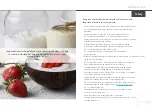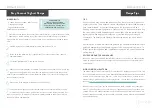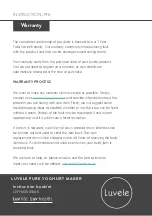
INSTRUCTION | P13
INSTRUCTION | P12
1
Open the cans and spoon the coconut cream directly into your yoghurt making bowl. Note:
Depending on the temperature of your home the coconut cream will vary in consistency.
On a hot day, the coconut cream will be runny while in cool weather you will need to spoon
it out.
2
Add the sugar and your preferred starter culture, and gently whisk it in.
3
Put the lid on and place into your yoghurt maker. The coconut cream is now ready to
begin fermentation.
4
Set the temperature to 38° C. and time to 24 hours.
5
After 24 hours the fermentation is complete. Switch the yoghurt maker off and remove the
yoghurt bowl. Straight from the warm maker, the yoghurt will be runny and the coconut
cream will have separated with coconut water at the bottom. This is normal. In the fridge, the
coconut cream will set firm.
6
Place the tub in the fridge for at least 6 hours to chill and set.
7
Thoroughly stir the yoghurt to incorporate the cream and coconut water before serving.
For extra thick coconut yoghurt, pour out some of the coconut water before stiring. Don’t
throw it away though - fermented coconut water is perfect added to smoothies or may be
used as a probiotic milk alternative.
Easy Coconut Yoghurt Recipe
INGREDIENTS:
• 4 cans of coconut cream, refer to note!
• 1 teaspoon of sugar
• Yoghurt starter culture
(follow packet instructions)
!
PLEASE NOTE:
Coconut cream should be
preservative free, additive free
and gluten free. Also the cans
should have BPA free lining.
BIFIDUS/BIFIDUM BACTERIA
The
original Specific Carbohydrate Diet (SCD), from the book ‘Breaking the Vicious Cycle’, calls
for a yoghurt starter that does not contain Bifidus/Bifidum bacteria. Bifidobacteria is a beneficial
bacteria, but in some cases it can ‘take over’. Just to be on the safe side, we usually recom
-
mend avoiding it in the beginning of your healing journey. You can find more information about
this here:
http://www.breakingtheviciouscycle.info/knowledge_base/detail/bifidus/
When it comes to probiotics, as with other supplements, there is variation in individual toler-
ances. One size does not fit all. If your probiotic or yoghurt starter is GAPS compliant, or your
certified GAPS or SCD health practitioner has recommended a particular probiotic brand, we
trust their judgment. At Luvele, we cannot make claims about specific strains or their interaction
with your unique body.
OTHER COCONUT CREAM BRANDS
Feel free to experiment with other additive-free brands of coconut cream to make this recipe.
Cans with a large percentage of ‘coconut pulp’ and a small portion of coconut water make
better yoghurt. .
Recipe Tips
TIPS:
24-hour yoghurt, even when made perfectly, will be thinner and runnier than other
yoghurt you’ve had. This is because it doesn’t have added thickeners and because it
hasn’t been ‘dripped.’ If you want thicker yoghurt, the first option is to drip it.
Dripping is what turns plain yoghurt into ‘Greek yoghurt.’ It’s the process of removing
the whey, which is liquid. Dripped yoghurt is also higher in protein per serving than
regular yoghurt. Dripping yoghurt is easy to do, just strain the yoghurt through a
cheesecloth. The excess whey (liquid) will drain away, leaving you with a thicker
yoghurt.
Another option is to add a thickener like gelatin to the milk before fermenting it. Since
gelatin is beneficial for gut health, adding gelatin to 24-hour yoghurt is a win-win. To
thicken your milk with gelatin, add 1 tablespoon of gelatin per 4 cups of milk before
heating the milk.









